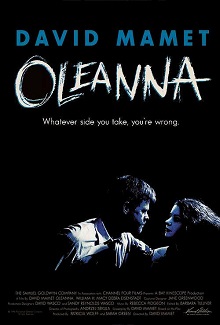
David Alan Mamet is an American playwright, filmmaker, and author.

As Good as It Gets is a 1997 American romantic comedy film directed by James L. Brooks from a screenplay he co-wrote with Mark Andrus. It stars Jack Nicholson as a misanthropic, bigoted and obsessive–compulsive novelist, Helen Hunt as a single mother with a chronically ill son, and Greg Kinnear as a gay artist.

Rebecca Pidgeon is an American/British actress who has appeared on stage and in feature films. She is also a singer, songwriter and recording artist.

William Hall Macy Jr. is an American actor, director, screenwriter, and producer. He is two-time Emmy Award and four-time Screen Actors Guild Award winner, and has been nominated for an Academy Award, a Drama Critics' Circle Award, and five Golden Globe Awards.

Spartan is a 2004 American action thriller film written and directed by David Mamet and starring Val Kilmer, Derek Luke, Tia Texada, Ed O'Neill, William H. Macy, and Kristen Bell. It was released in the United States and Canada on March 12, 2004.
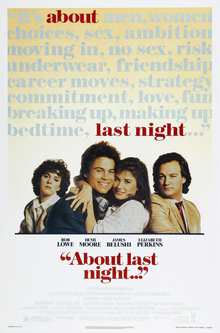
About Last Night is a 1986 American romantic comedy-drama film directed by Edward Zwick, and starring Rob Lowe and Demi Moore as Chicago yuppies Danny Martin and Debbie Sullivan, who enter a committed relationship for the first time. Along with featuring James Belushi as Danny's friend and colleague Bernie Litko, the film also marks the screen debuts of Elizabeth Perkins and Catherine Keener. The screenplay by Tim Kazurinsky and Denise DeClue is based on the 1974 David Mamet play Sexual Perversity in Chicago. The film was both critically and commercially successful, and was remade with a predominantly Black cast in 2014.

Big Top Pee-wee is a 1988 American comedy film directed by Randal Kleiser. A standalone sequel to Pee-wee's Big Adventure (1985), the film stars Paul Reubens reprising his role as Pee-wee Herman, with Susan Tyrrell, Kris Kristofferson, Penelope Ann Miller and Valeria Golino in supporting roles. The original music score is composed by Danny Elfman, who could not re-use themes from his Pee-wee's Big Adventure score, due to contractual restrictions. The film was released on July 22, 1988, and grossed $15 million against a $20 million budget. Another standalone sequel, Pee-wee's Big Holiday, was released in 2016.

Silent Fall is a 1994 American psychological thriller film directed by Bruce Beresford and starring Richard Dreyfuss, Linda Hamilton, John Lithgow, J. T. Walsh, and Liv Tyler in her debut role. The plot focuses on a boy with autism who is the only witness to the savage double murder of his parents.

A Walk in the Clouds is a 1995 period romantic drama film directed by Alfonso Arau and starring Keanu Reeves, Aitana Sánchez-Gijón, Giancarlo Giannini, Angélica Aragón, Evangelina Elizondo, Debra Messing and Anthony Quinn. An American-Mexican co-production, the film is an English-language remake of the 1942 Italian film Four Steps in the Clouds.

Homicide is a 1991 American crime drama film written and directed by David Mamet. The film's cast includes Joe Mantegna, William H. Macy, and Ving Rhames. It was entered in the 1991 Cannes Film Festival.

Oleanna is a 1992 two-character play by David Mamet, about the power struggle between a university professor and one of his female students, who accuses him of sexual harassment and, by doing so, spoils his chances of being accorded tenure. The play's title, taken from a folk song, refers to a 19th-century escapist vision of utopia. Mamet adapted his play into a 1994 film of the same name.
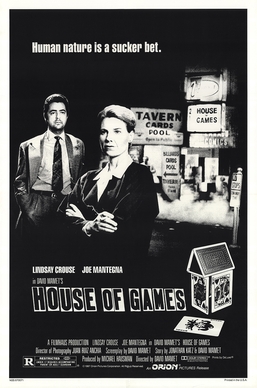
House of Games is a 1987 American neo-noir film about con-men and confidence scams by David Mamet, his directorial debut. He also wrote the screenplay, based on a story he co-wrote with Jonathan Katz. The film's cast includes Lindsay Crouse, Joe Mantegna, Ricky Jay, and J. T. Walsh.

Disclosure is a 1994 American erotic thriller film directed by Barry Levinson, starring Michael Douglas and Demi Moore. It is based on Michael Crichton's novel of the same name. The cast also includes Donald Sutherland, Caroline Goodall and Dennis Miller. The film is a combination thriller and slight mystery in an office setting within the computer industry in the mid-1990s. The main focus of the story, from which the film and book take their titles, is the issue of sexual harassment and its power structure. The film received mixed reviews from critics but was a box office success grossing $214 million against its $50 million budget.

Legal Eagles is a 1986 American legal romantic comedy thriller film directed by Ivan Reitman, written by Jim Cash and Jack Epps, Jr. from a story by Reitman and the screenwriters, and starring Robert Redford, Debra Winger, and Daryl Hannah.
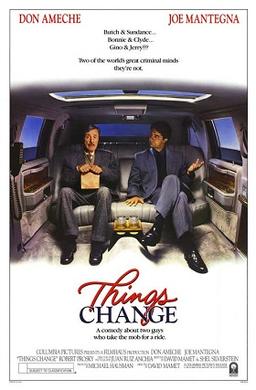
Things Change is a 1988 American comedy-drama film directed by David Mamet and starring Joe Mantegna and Don Ameche. It was co-written by Mamet and Shel Silverstein.

Good Luck Chuck is a 2007 comedy film starring Dane Cook and Jessica Alba, with screenplay by Josh Stolberg and directorial debut by long-time film editor Mark Helfrich. In the film, women find their "one true love" after having sex with a dentist named Chuck (Cook). Chuck meets a girl named Cam (Alba) and tries to become her true love. The film opened in theaters on September 21, 2007, and was panned by critics. One of Good Luck Chuck's theatrical posters parodied the well-known Rolling Stone cover photographed by Annie Leibovitz featuring John Lennon and Yoko Ono in similar poses.
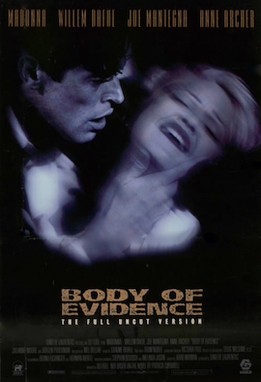
Body of Evidence is a 1993 erotic thriller film directed by Uli Edel, written by Brad Mirman, and starring Madonna and Willem Dafoe, with Joe Mantegna, Anne Archer, Julianne Moore, and Jürgen Prochnow in supporting roles.
Debra Eisenstadt is an American writer, director, producer and editor.

Focus is a 2001 American drama film starring William H. Macy, Laura Dern, David Paymer and Meat Loaf based on a 1945 novel by playwright Arthur Miller. The film premiered at the Toronto International Film Festival and was given a limited release on October 19, 2001.

Miracle on 34th Street is a 1994 American Christmas fantasy comedy-drama film directed by Les Mayfield and produced and co-written by John Hughes. The film stars Richard Attenborough, Elizabeth Perkins, Dylan McDermott, J. T. Walsh, James Remar, Mara Wilson, and Robert Prosky. It is the first theatrical remake of the original 1947 film. Like the original, this film was released by 20th Century Fox.
